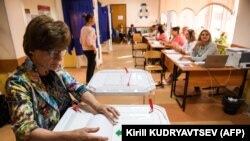After nearly two months of demonstrations against officials’ refusal to register independent and opposition candidates for Moscow’s city council, candidates allied with Russia’s ruling party, United Russia, swept the polls in nationwide local elections on September 8. Denouncing the preliminary results as fraudulent, government critics plan to continue their protests in Moscow against the election’s conduct.
•According to preliminary results, 19 candidates from the so-called established opposition – the Communist Party of the Russian Federation (13 seats), Yabloko (3 seats), and Fair Russia (3 seats) -- were elected to the 45-member Moscow City Duma. Pro-government, “independent” candidates won the remaining 26 seats, sufficient for a majority.
None of these latter candidates ran as official representatives of the ruling United Russia party, but are largely understood to support their policies.
By comparison, during the last elections, in 2014, United Russia held outright or had allies in 38 city council seats, Reuters reported.
Moscow Mayor Sergei Sobyanin hailed Sunday's vote as “the most emotional and truly competitive in all of recent history.”
Turnout, though, stood at a mere 21.77 percent of the city’s roughly 7.3 million registered voters -- slightly higher than in the last local elections in 2014, according to the Moscow Election Commission.
Alleging widespread falsification, anti-corruption activist Lyubov Sobol, one of the most prominent would-be candidates, commented on Twitter that the vote made history because of “Muscovites’ courage and persеverance” and Mayor Sobyanin’s alleged “cowardice and sneakiness.”
The city already has denied a request to hold election protests on September 14 on Moscow’s Sakharov Avenue.
For almost two months, protests, mostly not sanctioned by the government, have taken place in Moscow over election officials’ refusal to register the candidacy of more than two dozen government critics. The officials cited allegedly forged signatures and other irregularities as the cause.
An August 22-28 survey by the Levada Center, an independent pollster, found that only 23 percent of 1,608 Russians agreed with the demonstrations. Forty-five percent expressed indifference.
As the street protests continued, a number of criminal cases were filed against both the would-be candidates and protest participants, including for alleged participation in “mass disturbances,” use of violence against law enforcement, violation of demonstration rules, and inciting hatred with a threat of violence.
On September 18, police detained 14 individuals, including Novaya Gazeta journalist Ilya Azar and former Pussy Riot activist Maria Alekhina, who were wearing t-shirts that indicated support for those charged in what Russian media call “the Moscow case.”
All 14 have been released. Alekhina commented to Interfax that she had been charged for disrupting “a public event;” September 8 doubled as City Day in Moscow.
• In a notable election upset, one pro-government candidate, Valeria Kasamara, the Vice-Chancellor of Moscow’s Higher School of Economics, lost in the 45th district to Mahomed Yandiyev of Fair Russia. Yandiyev was a participant in opposition activist Aleksei Navalny’s Smart Voting project, which advised voters on whom to support based on their chances of beating pro-government candidates.
• All acting regional executives who campaigned in 16 regional elections secured their seats, according to preliminary data from September 9. In particular, acting Governor of St. Petersburg Aleksandr Beglov, a former regional presidential envoy accused of campaign violations, secured St. Petersburg’s governorship with 64 percent of the vote.
United Russia claims that it has won "more than 60 percent" of the elections for regional legislatures in 85 different regions, according to RIA Novosti. Senior party official Andrei Turchak hailed that result as a sign that "trust is growing" in the party, the agency noted.
Vladimir Zhirinovsky's LDPR (Liberal-Democratic Party of Russia), a multiple-personality party that often both criticizes and backs the Kremlin, won 56.12 percent of the seats in southeastern Khabarovsk's regional assembly, however. It also took 34 of the seats in the city of Khabarovsk’s 35-seat council. Fair Russia won the remaining seat.
• The election-monitoring group Golos (Voice) reported 1,708 voting violations throughout Russia, with the highest rates in Moscow (564 cases) and St. Petersburg (228 cases).
Moscow Election Commission Chairman Valentin Gorbunov, however, asserted that not a single violation occurred in the Russian capital. Official reports about two violations could not be confirmed, he told reporters on September 9, RIA Novosti reported.
Central Election Commission Chairwoman Ella Pamfilova underlined that not all of the reported violations are legitimate, and then went a step further.
“This is also a way of earning money,” she claimed, referring to watchdog groups’ allegations of widespread violations, the daily Izvestiya reported. “There’s demand, obviously, from somewhere. When there’s demand, there’s supply.”
She charged that Golos had published 30 violations on its site from the last elections in 2014. The organization has not yet responded online.





Facebook Forum